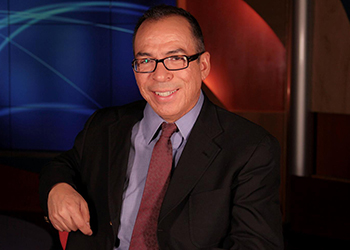Following last month’s hugely successful Mexico Moving Forward symposium, the Center for U.S.-Mexican Studies (USMEX) at the School of International Relations and Pacific Studies is hosting another daylong conference, “Libertad Bajo Palabra: Censorship, Satire and the Press in Mexico.”
Organized by Visiting Fellow Michael Lettieri, “Libertad Bajo Palabra” is a unique, bi-national conference featuring both established and emerging scholars as well as contemporary journalists. It opens with a keynote speaker in the evening of Wednesday, April 30 followed by three panel discussions and a roundtable the following day, Thursday, May 1.
“Bringing together academics and journalists from both sides of the border, this conference seeks to expand our understanding of what a free press has meant to Mexico during the 20th and 21st centuries,” Lettieri said. “It has become increasingly clear that the relationship between the government, the press and the public was, and is, far more complex than previously thought, and that the challenges facing journalists today are being met with courage and innovation.”
Lettieri made note of the increasing violence against journalists reporting on the global drug trade and how this has darkened the outlook for Mexico’s press. The conference features several journalists working in and reporting on Mexico, including its keynote speaker, Alfredo Corchado.
Corchado, the Mexico bureau chief at the Dallas Morning News and expert on immigration, drug violence and foreign policy between the United States and Mexico, will speak Wednesday evening. Corchado has reported on everything from the disappearance of women in Juarez and government corruption to the reach of drug traffickers into the U.S. He is the author of “Midnight in Mexico.”
“We are very much looking forward to having Alfredo Corchado give the keynote address at our conference, to hear his prospective on contemporary challenges for journalists in Mexico,” said USMEX Assistant Director Melissa Floca. “His perspective is unique because he is a journalist in the U.S. with deep ties to Mexico.”
Corchado’s talk and a following reception will be at the Institute of the America’s Malamud Conference Room. The main conference starts the following day at 9 a.m., taking place at UC San Diego’s The Villages West, building two.
The first panel, “Press and the Public Sphere,” is from 9 – 10:45 a.m. followed by “The PRI and the Press” at 11 a.m. After a short lunch break, the conference returns with its third panel, “Perspectives on Censorship and Democratization.”
“This conference brings together papers that will enrich our understanding of both the past and the present of Mexican journalism, from the experience of the PRI [Partido Revolucionario Institucional] regime to the process of democratization and the contemporary specter of ‘narco-violence,’” Lettieri said.
In addition to organizing the conference, Lettieri will also participate in the second panel, headed by commentator Peter Smith of UC San Diego. Smith, the Simon Bolivar professor of Latin American studies and distinguished professor of political science, served as director of the Center for Iberian and Latin American Studies and specializes in comparative politics, Latin American politics and U.S.-Latin American relations.
David Shirk, University of San Diego professor and principal investigator at the Justice in Mexico Project, will serve as commentator for the third panel. Shirk, along with conference participant Pablo Piccato, is a former USMEX visiting fellow, and will be joined by current fellow Vanessa Freije in the discussion. Freije’s research at the Center involves investigating press and democratization in Mexico from 1965 – 1988.
An informal and lively roundtable on contemporary challenges for press freedom in Mexico closes out the day, with introductory remarks by Javier Valdez Cardenas at 4 p.m. Journalists at the top of their field – Adela Navarro Bello, Vicente Calderon, Adriana Malvido and Eileen Truax – will join USMEX visiting fellow Froylan Enciso to discuss access to resources, cross-border collaboration and transparency, among other pressing issues. Navarro Bello is a former Pacific Leadership Fellow for the Center on Emerging and Pacific Economies, also housed at IR/PS.
“Mexican journalism is under siege by violence and censorship but the creativity and solidarity among journalists and social groups on both sides of the U.S.-Mexico border can help overcomes these challenges,” Enciso said. “I see this panel discussing ideas that could help foster creativity and solidarity.”
Full information on the conference, inlcuding its guest speakers, is on the complete agenda (PDF).
